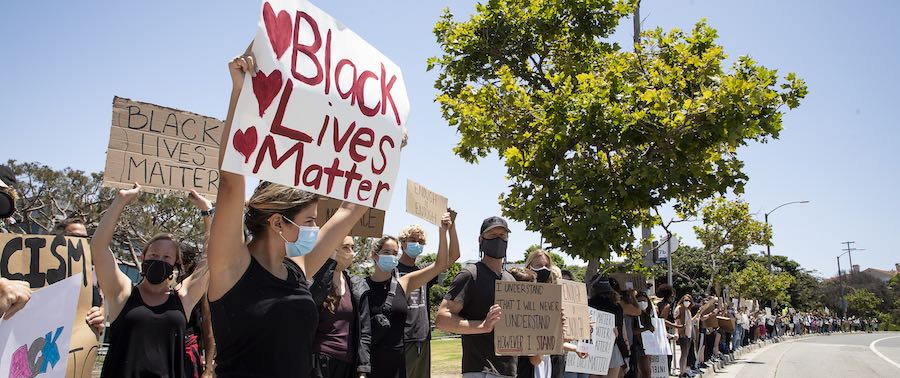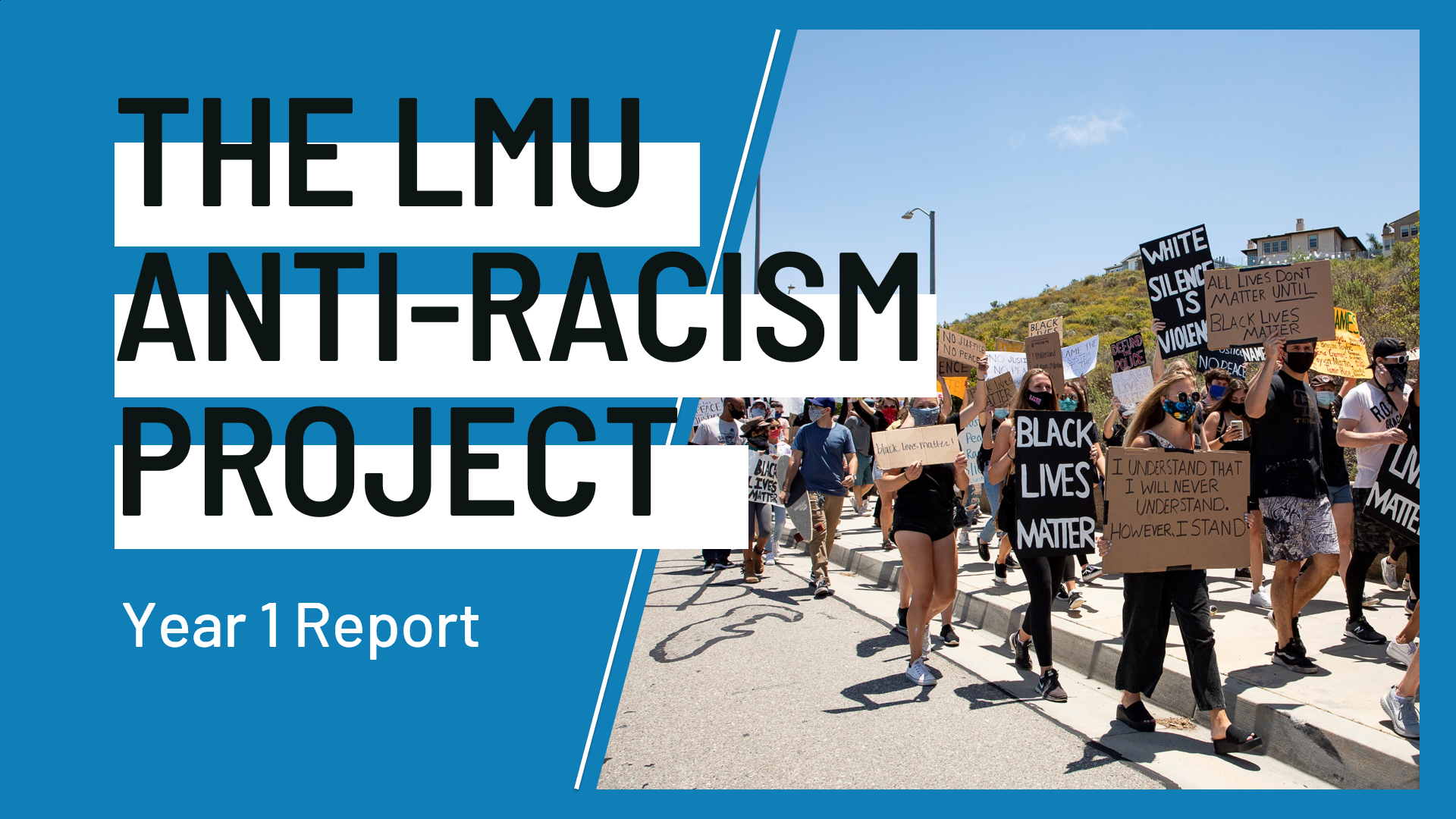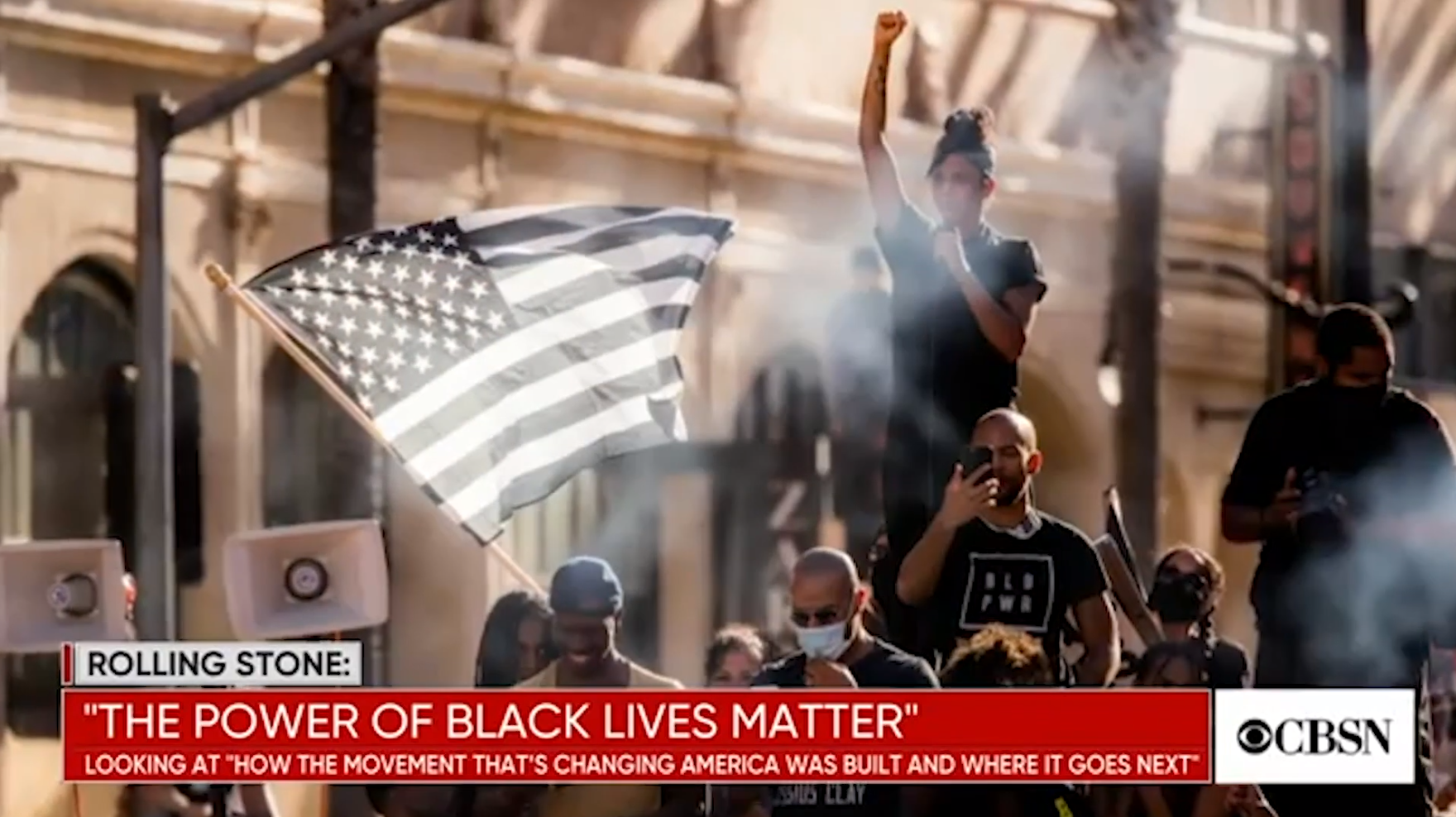
The Anti-Racism Project is rooted in our Catholic, Jesuit, and Marymount identity and university mission, where we regard and treat each other with respect, recognizing the inherent dignity and immutable humanity of all peoples, made in the image of God. We are called to be persons for and with others, acting out of our faith—inclusive of our varied religious traditions and worldviews—towards social justice for all.
Overview of The Anti-Racism Project (Emelyn dela Peña, VP for Diversity, Equity and Inclusion)
Details in Cabinet Corner; September 8, 2020
LMU’s Anti-Racism Project invites and challenges members of the LMU community to engage in a collective commitment to anti-racism at multiple levels (e.g., institution-wide, unit-level, individual) and through different modalities (e.g., dialogue, workshops, reading, personal and communal reflection, prayer, examination of data, etc.). Anti-racism presents each of us with particular personal challenges, given our various cultural realities, social positions, religious traditions/personal worldviews, and lived experiences. Each of us is responsible for growing into anti-racism from where we are. Moving towards anti-racism as an institution, however, means that we commit to using our varied roles, training, experiences and perspectives to identify systemic issues, problem-solve, and hold our units accountable as we implement solutions and move our institution forward in a lifelong process of learning.
Year 1 Outcomes and Progress
Overview the LMU Anti-Racism Project and see what steps units and individuals across campus have been taking to transform our structures and systems for a more equitable, inclusive, and anti-racist LMU.
Black Students, Staff and Faculty Speak Out
#BlackatLMU, August 2020
Black LMU Student Demands
Actions Beyond Words: BFSA
The Black Faculty and Staff Association's Response and Challenge to the President
LMU Student Melanie An ('23)
Film & Production (SFTV)
Digital Storytelling Project
Taking a look at how the Black Lives Matter movement has impacted education and curriculum at Loyola Marymount University in Los Angeles
Presidential Commitments
Letters from President Snyder:
- Speaking Up and Taking Action - June 1, 2020
- Beyond Words - June 16, 2020
- Reaffirming Our Commitment to Dreamers - June 18, 2020
- Welcome Back, Lions - September 1, 2020
- Acknowledgment of Understanding and Commitment - September 4, 2020
Three Commitments to Anti-Racism, Outlined in Beyond Words
HIRING
“We will increase the diversity and inclusiveness of our LMU community and commit resources to do so.”
CLIMATE AND CULTURE
“We will ensure that our organizational climate and culture are anti-racist, equitable, and inclusive, with particular attention to anti-Black racism.”
EDUCATION
“An LMU education must be unequivocally inclusive and anti-racist.”
Levels of Engagement
| HIRING |
InstitutionalShared Vision and Campus Awareness |
Develop shared vision for initiative that is grounded in mission and overarching goals Establish common language and use of terms Educate on big picture to increase campus awareness and investment |
|---|---|---|
|
CLIMATE & CULTURE |
Unit-SpecificEmpowerment and Capacity Building |
Empower participation and ownership by units Translate vision into deliverables that make sense and are meaningful to units Identify measurable action steps that facilitate transparency and accountability |
|
EDUCATION |
IndividualPersonal Growth and Professional Development |
Invite individuals to engage in deeper work of unlearning racism Promote personal growth and connection with others Connect personal learning to professional activities |
Register for an Implicit Bias Workshop
LMU’s Implicit Bias Initiative, which launched in October 2016, remains an important focus for Diversity, Equity and Inclusion. Our IB workshops help administrators, faculty, staff, and students achieve bias literacy; encourage administrators, faculty, staff, and students to use their new knowledge by engaging in intentional behavioral changes that reduce the activation and application of implicit bias; and supports a change in cultural norms across all components of LMU’s environment.
Individuals can contribute to a culture and climate of inclusive excellence by attending a workshop. Contact Joseph.Bernardo@lmu.edu to request a workshop for your team or for more information on upcoming workshops.
Cultural Consciousness Conversations
Cultural Consciousness Conversations is a project of Diversity, Equity and Inclusion in collaboration with Ethnic & Intercultural Services. This cohort of faculty, staff, and administrators from various divisions around campus get together once a month to share stories, learn from one another, examine societal norms and cultural differences, and deepen connections across all sectors of the LMU community. The aim of this project is to cultivate intergroup relations, including campus conversations and dialogues around difference.
Other Resources for Individuals
- Faculty and Staff Affinity & Networking Groups are always open to new participants
- Explore services offered by Mission & Ministry
- The Center for Faculty Development (CFD) provides a library of resources, semesterly workshops, and other programming related to professional development and improving pedagogy
- STUDENTS: Explore the Virtual EXP Hub for resources related to service, justice, and engaging in the community through our current online environment
Academic and Staff Units
Systemic Analysis
As we move into a new academic year, Diversity, Equity and Inclusion continues to develop resources, support, and programming that can help facilitate our university’s efforts to address systemic racism in concrete ways.
How do we proceed with addressing systemic racism?
An internally focused systemic analysis is the first step. The point of this process is to consider how obstacles are “baked” into our systems and structures for the students we are trying to serve. In doing so, we flip our perspective from asking “how do we change students to better meet the challenges of an LMU education?” to “how do we change our institutional structures and processes to be more equitable, responsive, and inclusive in meeting the needs of all our students?”
CURes: Restorative Justice Project
The vision of the LMU Center for Urban Resilience (CURes) Restorative Justice Project (RJ Project) is to impact systemic education reform and transform social structures towards a more just society. Aligning with LMU’s mission and its commitment to anti-racism, Restorative Justice Practices are based on principles that emphasize how positive relationships are central to building community and involve processes that restore communities when harm occurs. The RJ Project offers culturally grounded ways to address conflict through restorative practices trainings, Restorative Conferencing facilitation services, and opportunities to collaborate. For instance, LMU Restore in Student Affairs works in partnership with the RJ Project for staff training as well as for utilizing Restorative Justice Practices to respond to violations of the Student Conduct Code.
RESTORATIVE PRACTICES TRAINING
Restorative Practices (RP) is a philosophy that aims to provide communities with safe, inclusive, and effective tools to develop healthy relationships. RP also helps teach Social Emotional Learning (SEL) skills such as understanding and managing emotions, exhibiting empathy, and establishing and maintaining positive relationships. The RJ Project provides trainings to equip participants to implement RP in their own divisions.
The RJ Project offers RP training components including:
- Campus Environment Assessment
- Implementation
- Restorative Language Integration
- Community Building Circles Facilitation
- Responding to Critical Matters Facilitation
- Skill-building and Coaching
- Program Evaluation
RESTORATIVE CONFERENCING FACILITATION SERVICES
When conflict occurs, Restorative Conferences can help hold responsible parties accountable for their actions. A trained, impartial facilitator invites affected parties and their supporters to discuss:
- What happened?
- How has everyone been affected?
- What can be done to repair the harm?
Restorative Conferences provide a collective discovery process whereby underlying problems can be addressed and potentially help participants connect with much needed resources. If you are experiencing a conflict at an individual level or trying to figure out how to address a group issue, the RJ Project and LMU Restore stand ready to engage with you, including specific capacity building for your department or area.
For more information, please contact:
- Schoene Mahmood
Program Manager
Restorative Justice Project
Center for Urban Resilience
Schoene.Mahmood@lmu.edu - Julia Wade
Associate Director for Restorative Practices
Office of Student Conduct and Community Responsibility
Student Affairs
Julia.Wade@lmu.edu
Campus-Wide Listening Sessions
Racism & Trauma in the Modern Moment - Diversity, Equity and Inclusion hosted over 500 LMU community members -- students, faculty and staff -- at a virtual forum designed to acknowledge the trauma of systemic violence against African Americans. The conversation was oriented towards students and all community members negatively affected by the violence leading to the deaths of George Floyd, Breonna Taylor, and Ahmaud Arbery, the most recent victims of a longstanding, ongoing, historical trauma. Facilitators included: Dr. Stefan Bradley (BCLA), Megan Castillo '19 (graduate student and community organizer), Dr. Cheryl Grills (BCLA), and Henry Ward (EIS). At this forum, many students were given the space to share their feelings, experiences, and expectations of the university; a beginning step to the anti-racism project.
University Advancement
LMU Solidarity Hour - Alumni Engagement partnered with Diversity, Equity and Inclusion to change LMU Global Happy Hour to LMU Solidarity Hour. Participants were able to listen and learn about how we can advocate for change in our own communities, reflecting our values as people for and with others. Dr. Cheryl Grills (Professor of Psychology) lead discussions on how to emancipate our minds in order to create a just society.
Black Alumni Panel - Alumni Engagement in collaboration with Diversity, Equity and Inclusion and the African American Alumni Association, hosted their first Black Alumni Panel. During this discussion, we heard stories from our alumni to help inform and guide the university’s commitment and strategy to address systemic oppression and anti-Black racism in a comprehensive manner. Participants attended a breakout session of their choice based on their preference by College/School, Athletics or Student Affairs. Notes from the listening session will guide the university with next steps to assure an LMU experience and education that is inclusive and anti-racist.
African American Alumni Association Ambassadors Meetings - The African American Alumni Association (AAAA) was established to provide financial assistance to deserving undergraduate LMU students who achieve academically and actively support their community. AAAA ambassadors volunteer as an extension of the university to promote and support LMU within their Lion network representing the Black student and alumni community. AAAA ambassadors meet annually to discuss fundraising, scholarships, alumni events, and other university updates.
Contact alumni@lmu.edu to learn about upcoming listening sessions and opportunities for further feedback.

